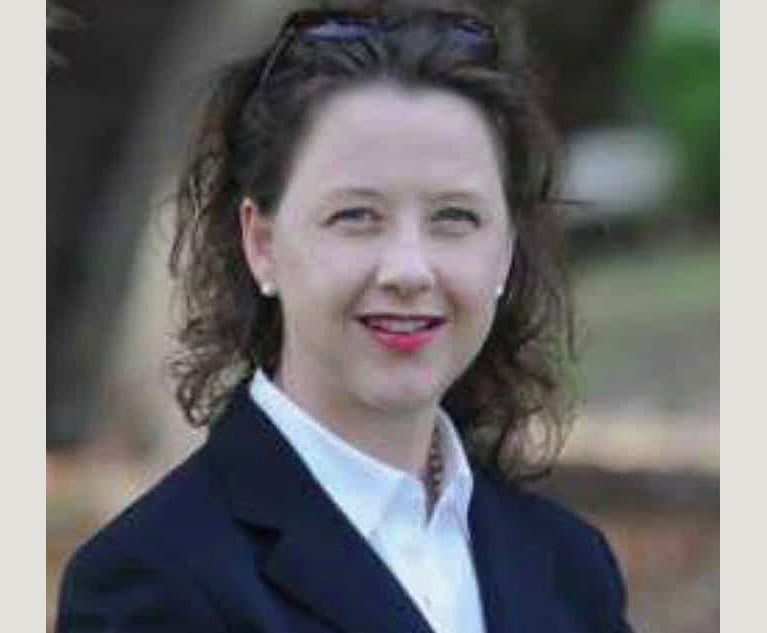Mental Health Advocates Say Georgia Will Miss DOJ Deadline
At a recent panel centered around the U.S. Department of Justice's 2010 landmark settlement with Georgia over the care of its developmentally disabled citizens, mental health advocates said the state will likely miss the agreement's June 30 compliance deadline. But that doesn't mean that Georgia hasn't made big strides in integrating these individuals into their communities, the panelists explained.
May 14, 2018 at 05:42 PM
4 minute read
 Left to right: Judy Fitzgerald, commissioner of the Georgia Department of Behavioral Health and Developmental Disabilities, Jewell Gooding, executive director of Mental Health America of Georgia, Cynthia Wainscott, a member of the Georgia Department of Behavioral Health and Developmental Disabilities Regional Advisory Council, and Susan Goico, staff attorney with the Disability Integration Project at Atlanta Legal Aid Society, during a panel discussion at the Carter Center. Photo credit: Carter Center
Left to right: Judy Fitzgerald, commissioner of the Georgia Department of Behavioral Health and Developmental Disabilities, Jewell Gooding, executive director of Mental Health America of Georgia, Cynthia Wainscott, a member of the Georgia Department of Behavioral Health and Developmental Disabilities Regional Advisory Council, and Susan Goico, staff attorney with the Disability Integration Project at Atlanta Legal Aid Society, during a panel discussion at the Carter Center. Photo credit: Carter Center June 30 is the deadline for Georgia to remove developmentally disabled adults from state mental hospitals, but it appears the process will likely continue beyond the end of next month.
That's the message that Susan Walker Goico, director of the Disability Integration Project at Atlanta Legal Aid Society, and other mental health public officials and advocates shared Friday during an event at the Carter Center in Atlanta.
Goico and others were speaking at a panel at the 23nd annual Rosalynn Carter Georgia Mental Health Forum about the U.S. Department of Justice's 2010 landmark settlement with Georgia over the care of its developmentally disabled citizens, outlining how far the state has come and how far it still needs to go.
“The extension agreement has no automatic termination date, so the hard work and diligence of the state will continue” beyond June 30, Goico said.
More than 230 individuals with developmental disabilities remain institutionalized in Georgia's mental hospitals, though that number is down from 1,142 in October 2010, said Cynthia Wainscott, a member of the Georgia Department of Behavioral Health and Developmental Disabilities (DBHDD) Regional Advisory Council, who also spoke on the panel.
The rate at which those placements are occurring is increasing as well, she added, as 31 individuals so far this year have been removed from state hospitals compared with the 16 that were moved during all of last year.
Stemming from a lawsuit brought by the DOJ's Civil Rights Division under the federal Americans with Disabilities Act, the October 2010 settlement agreement was intended to transform Georgia's delivery of services for people who have developmental disabilities. The mandate is meant to integrate these individuals into local communities.
Key to that community integration are provisions that the individuals in question have access to adequate social and medical services, including housing, supported employment and the guidance of adequate support staff and crisis teams, that would allow them to live in those communities while keeping them safe.
In signing the settlement, the state had agreed to comply with all its terms within five years. In September 2015, however, Justice Department lawyers formally notified the state it was not in compliance with the settlement, so in May 2016 the DOJ and Georgia entered into an extension agreement. This extension set June 30 as the deadline to provide housing outside the state's hospitals for its developmentally disabled adults.
The most recent report of the settlement's independent reviewer noted both the state's progress toward meeting that deadline and areas of noncompliance.
Panelist Jewell Gooding, executive director of Mental Health America of Georgia, pointed out that according to reviews, 30 of 39 individuals residing in a “crisis respite home” have been doing so for more than 30 days, and some have been in these residences since as early as 2013. These respite homes were developed during the first agreement with the DOJ to provide short-term care for individuals with developmental disabilities and their families.
Even with the delay in compliance, the landscape for individuals suffering from mental health and developmental disabilities in Georgia today is unrecognizable from that of even 10 years ago, said panelist Judy Fitzgerald, commissioner of the state DBHDD. She said she recently reread the complaint in the original lawsuit from the Justice Department and found the experience both “depressing and rewarding.”
“It was painful to read about individuals in such a broken system but rewarding because that's not the system we are anymore,” Fitzgerald said.
The Daily Report could not reach a representative for the state.
Atlanta's Troutman Sanders and Robbins Ross Alloy Belinfante Littlefield have been defending the state in the matter.
This content has been archived. It is available through our partners, LexisNexis® and Bloomberg Law.
To view this content, please continue to their sites.
Not a Lexis Subscriber?
Subscribe Now
Not a Bloomberg Law Subscriber?
Subscribe Now
NOT FOR REPRINT
© 2025 ALM Global, LLC, All Rights Reserved. Request academic re-use from www.copyright.com. All other uses, submit a request to [email protected]. For more information visit Asset & Logo Licensing.
You Might Like
View All

Ex-Prosecutor’s Trial Ends as Judge Throws Out Her Felony Indictment in Ahmaud Arbery Death Case


Ex-Prosecutor Denies on Witness Stand That She Tried to Protect Ahmaud Arbery's Killers
Trending Stories
- 1Thursday Newspaper
- 2Public Notices/Calendars
- 3Judicial Ethics Opinion 24-117
- 4Rejuvenation of a Sharp Employer Non-Compete Tool: Delaware Supreme Court Reinvigorates the Employee Choice Doctrine
- 5Mastering Litigation in New York’s Commercial Division Part V, Leave It to the Experts: Expert Discovery in the New York Commercial Division
Who Got The Work
J. Brugh Lower of Gibbons has entered an appearance for industrial equipment supplier Devco Corporation in a pending trademark infringement lawsuit. The suit, accusing the defendant of selling knock-off Graco products, was filed Dec. 18 in New Jersey District Court by Rivkin Radler on behalf of Graco Inc. and Graco Minnesota. The case, assigned to U.S. District Judge Zahid N. Quraishi, is 3:24-cv-11294, Graco Inc. et al v. Devco Corporation.
Who Got The Work
Rebecca Maller-Stein and Kent A. Yalowitz of Arnold & Porter Kaye Scholer have entered their appearances for Hanaco Venture Capital and its executives, Lior Prosor and David Frankel, in a pending securities lawsuit. The action, filed on Dec. 24 in New York Southern District Court by Zell, Aron & Co. on behalf of Goldeneye Advisors, accuses the defendants of negligently and fraudulently managing the plaintiff's $1 million investment. The case, assigned to U.S. District Judge Vernon S. Broderick, is 1:24-cv-09918, Goldeneye Advisors, LLC v. Hanaco Venture Capital, Ltd. et al.
Who Got The Work
Attorneys from A&O Shearman has stepped in as defense counsel for Toronto-Dominion Bank and other defendants in a pending securities class action. The suit, filed Dec. 11 in New York Southern District Court by Bleichmar Fonti & Auld, accuses the defendants of concealing the bank's 'pervasive' deficiencies in regards to its compliance with the Bank Secrecy Act and the quality of its anti-money laundering controls. The case, assigned to U.S. District Judge Arun Subramanian, is 1:24-cv-09445, Gonzalez v. The Toronto-Dominion Bank et al.
Who Got The Work
Crown Castle International, a Pennsylvania company providing shared communications infrastructure, has turned to Luke D. Wolf of Gordon Rees Scully Mansukhani to fend off a pending breach-of-contract lawsuit. The court action, filed Nov. 25 in Michigan Eastern District Court by Hooper Hathaway PC on behalf of The Town Residences LLC, accuses Crown Castle of failing to transfer approximately $30,000 in utility payments from T-Mobile in breach of a roof-top lease and assignment agreement. The case, assigned to U.S. District Judge Susan K. Declercq, is 2:24-cv-13131, The Town Residences LLC v. T-Mobile US, Inc. et al.
Who Got The Work
Wilfred P. Coronato and Daniel M. Schwartz of McCarter & English have stepped in as defense counsel to Electrolux Home Products Inc. in a pending product liability lawsuit. The court action, filed Nov. 26 in New York Eastern District Court by Poulos Lopiccolo PC and Nagel Rice LLP on behalf of David Stern, alleges that the defendant's refrigerators’ drawers and shelving repeatedly break and fall apart within months after purchase. The case, assigned to U.S. District Judge Joan M. Azrack, is 2:24-cv-08204, Stern v. Electrolux Home Products, Inc.
Featured Firms
Law Offices of Gary Martin Hays & Associates, P.C.
(470) 294-1674
Law Offices of Mark E. Salomone
(857) 444-6468
Smith & Hassler
(713) 739-1250






